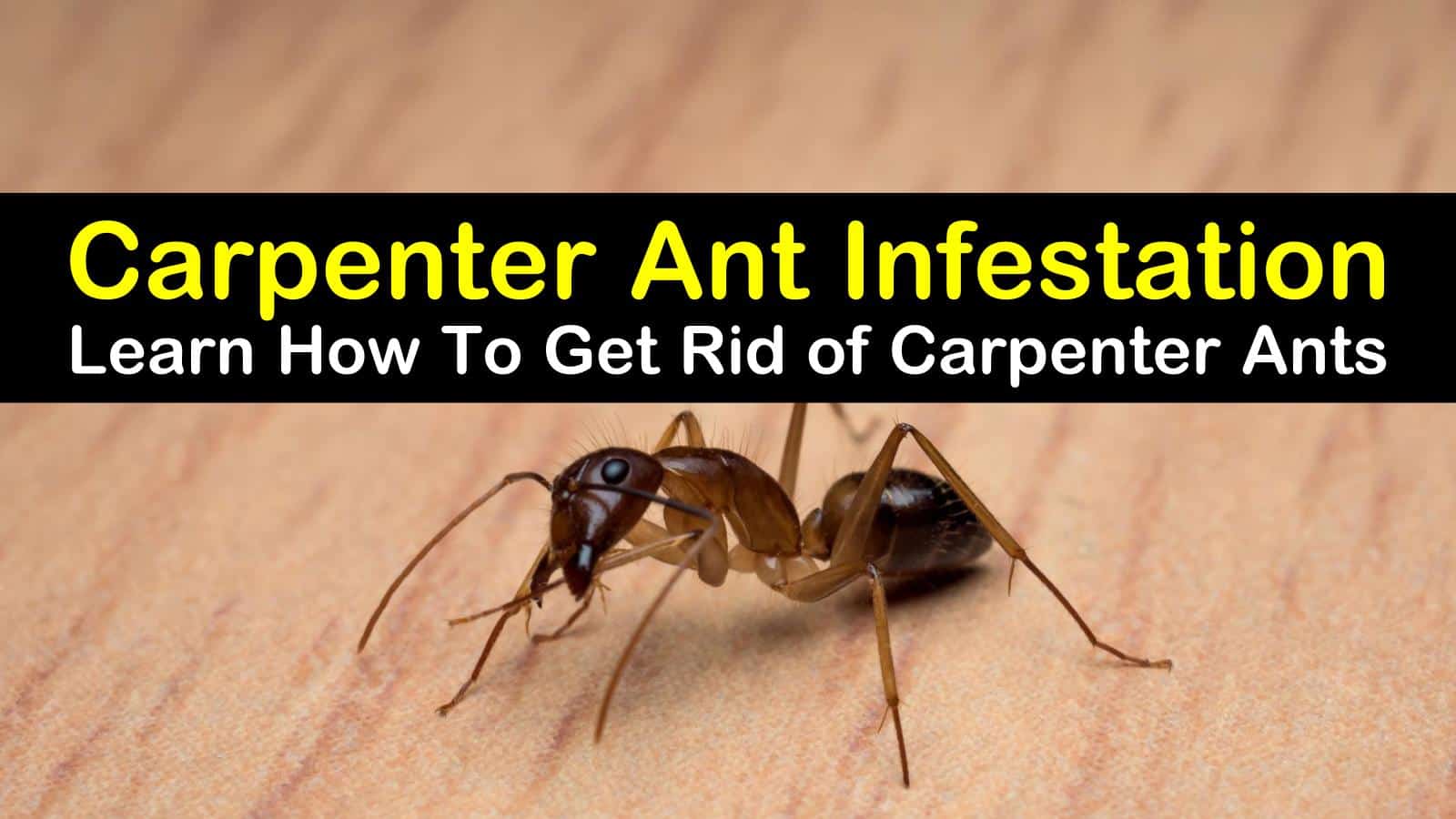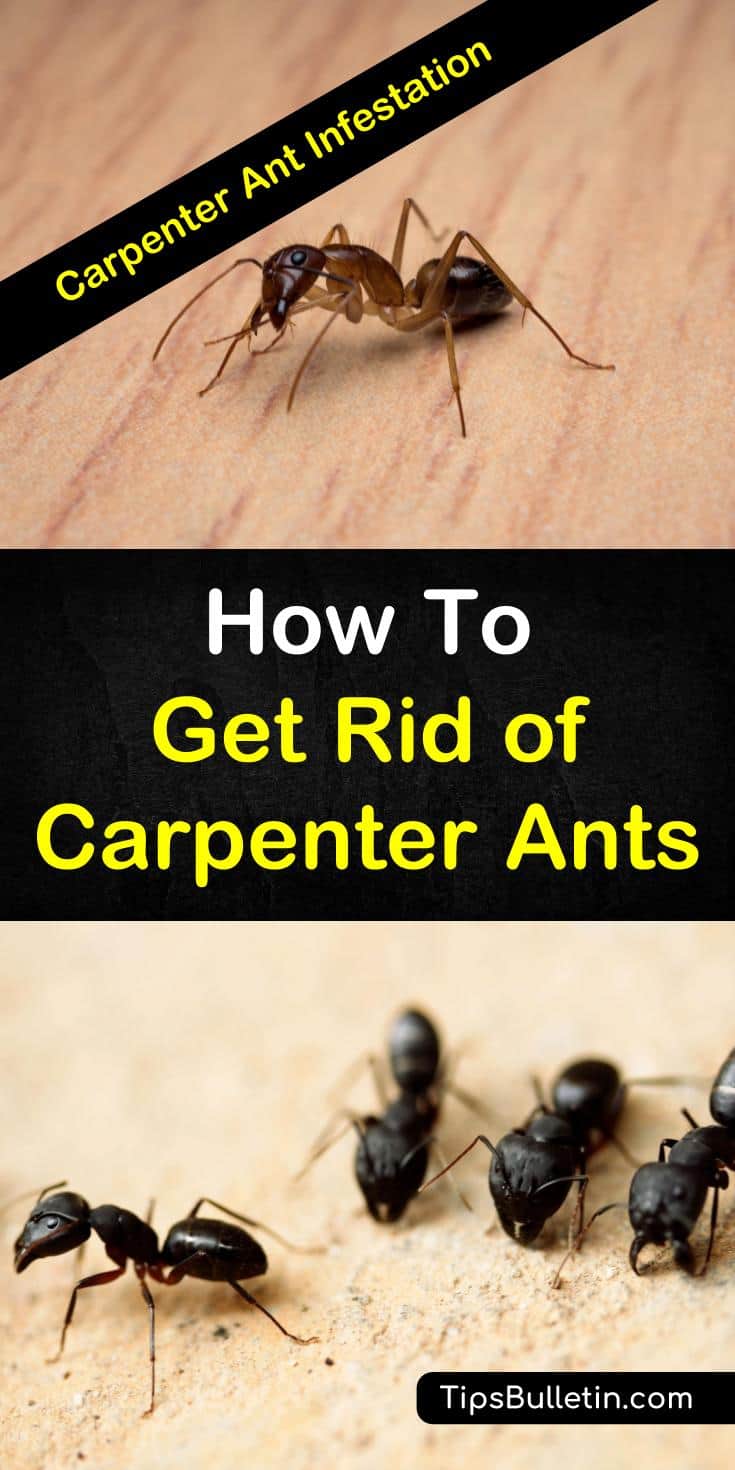Insects will always find ways to get into our homes to eat our leftover food and damage our houses. While many insects might invade your home, few will cause a homeowner to panic more than the wood-destroying carpenter ants.
This particular ant species will damage the wood around your house by tunneling and nesting inside the wood. Carpenter ants like to nest in wall voids, hollow doors, beams, cabinets, and structural lumber. If you are dealing with a carpenter ant infestation, learn how to get rid of carpenter ants naturally.
Unlike termites, these pests don’t feed on the wood; instead, they like to burrow into it to build their nests. These big black ants like to live in damp, decaying lumber because it is much easier for them to excavate. You will typically find a carpenter ant nest in tree limbs, tree stumps, and tree branches.

When outside, carpenter ant colonies don’t cause much harm, but once they find their way inside, they will scour for savory and sweet foods that they can take back to the parent colony.
What do Carpenter Ants Look Like?
Compared to other kinds of ants, carpenter ants are relatively large, measuring up to ¾ of an inch in length. While most carpenter ants are black, some species will appear reddish brown or yellowish.
Spring is when the black carpenter ants come inside; however, the presence of carpenter ants in your home doesn’t necessarily mean you have a carpenter ant problem. If you’re concerned about the carpenter ants that you find in your home, you’ll need to determine whether they are coming from outside or an inside nest.
Signs You Have a Carpenter Ant Infestation
A visible sign that you have a carpenter ant infestation is the presence of worker ants inside your home. However, this isn’t necessarily a sure sign that an entire colony and any satellite colonies of carpenter ants have established their nest within your home.
Since carpenter ants burrow into wood to create their nests, you might hear a rustling sound inside walls or woodwork. If an infestation is severe, you may notice carpenter ant damage in the form of wood shavings beneath window sills and other wood objects in your home.
Getting Rid of Carpenter Ants Naturally
If you are dealing with an infestation of carpenter ants, your first reaction might be to call a local pest control company that specializes in pest management. However, many of the products that these companies use for pest control contain toxic chemicals that could be harmful to your family and damage the environment. Over time, the chemicals used in commercial insecticides will cause respiratory disorders when inhaled.

It is highly effective and safer to use home remedies to get rid of carpenter ants. Here’s how to get rid of carpenter ants in your home with safe and natural ingredients.
Food Grade Diatomaceous Earth
Diatomaceous earth or DE is a 100% organic and all natural, silica-rich powder that is an extremely effective way to kill carpenter ants, aphids, and a myriad of other insects that may be causing problems inside or outside the home. The insecticide dust is deadly to insects and contains the fossilized remains of microscopic algae called diatoms.
The razor sharp edges of the diatoms rip through the fragile exoskeleton of the insects and suck the moisture from their body, effectively dehydrating them until they die. Once you’ve determined the nest location, you can use diatomaceous earth to kill the entire colony.
Use a device, like a medicine dropper, to inject the DE into the nest and let the fossilized diatoms do the rest. You can also use diatomaceous earth to kill other types of ants, roaches, fleas, and any other pest that is causing you problems, too. Food-grade DE is safe to use around pets and children and it is quite inexpensive.
Boric Acid
Boric acid is a white, odorless powder that is known for its antibacterial, antifungal, and antiviral properties. The dry powder adheres to the carpenter ants’ exoskeleton, and when the groom their legs and ingest the boric acid it works as a stomach poison, leading to the carpenter ants death.
In a small container, mix the sugar and boric acid. Sprinkle the mixture around your home where you suspect the carpenter ants are entering. The sugar will attract the carpenter ants, but the toxicity of the boric acid that the carpenter ants feed on will kill them.
You can use this mixture for perimeter treatments around your home, so the carpenter ants take the small particles back to their satellite nests and eliminate the entire colony.
White Vinegar
A staple product in most homes, white vinegar is a convenient remedy for carpenter ant control. With its five percent acidity ratio, white vinegar is exceptionally toxic to carpenter ants. The pungent smell will make the carpenter ants keep their distance.
Combine equal parts vinegar and water in a spray bottle and spray the solution directly into a carpenter ant nest to eradicate the entire colony. You can also use this solution as a perimeter spray and spray it around your home, especially at entry points in your home.
Liquid Dish Soap
Liquid dish soap is another convenient and highly effective homemade fire ant killer. Ants and other insects breathe through their skin, so spraying them with a mixture of water and dish soap will effectively suffocate them.
Add all ingredients to a spray bottle. Spray the solution directly on any carpenter ants that you spot, and down into their nests to get rid of the entire colony.
Peppermint Essential Oil
Peppermint essential oil is an organic insect repellent that is effective at keeping carpenter ants and also spiders away from your home naturally, as well as being effective at repelling spiders. When ants enter your house looking for food and water sources, they leave a scent trail so their fellow ants can follow in their footsteps.
The strong aroma of the peppermint oil disrupts their abilities to follow the path and keeps them from being able to smell any food sources. It also works as a pet safe homemade ant killer, as most essential oils are not strong enough to affect a dog or cat.
Fill a spray bottle with distilled water. Add the essential oils and secure the cap. Shake well to make sure all the ingredients are combined. Spray the solution around your kitchen and anywhere else where ants might be entering your home.
You can also place one drop of the peppermint oil on cotton balls and leave them in areas where you suspect ants are entering your home. You can also put peppermint plants around your doorways to keep ants from entering your home.
Put Up Defensive Barriers
To keep ants from entering into your house, you can put up defensive barriers around areas in your home that might be access points, like your doors, windows, and any cracks and crevices you might have in your walls and baseboards. Many of the products that you can use as a barrier are most likely in your pantry.
The idea here is that these natural defensive barriers disrupt the pheromone trails that are left when ants enter your home. If they are unable to detect the scent trail that they left behind, they won’t be able to follow the same path to their food and water source.
Unfortunately, they may still be able to find another way into your home, so you should use this deterrent along with some of the other methods mentioned for killing and repelling ants.
Does Neem Oil Kill Ants?
Neem oil is an extremely effective insecticide that is safe to use around humans and pets. But, does neem oil kill ants? Unfortunately, neem oil doesn’t directly kill ants. Instead, it disrupts their hormonal balance and causes them to die before they can transform into their next stage of life.
The active ingredient, Azadirachtin, works to reduce their feeding activity and makes it harder for them to grow and lay eggs. So, while neem oil isn’t a long-term solution to a carpenter ant problem, it can be used with the other proven methods to reduce the population dramatically.
Commercial Pest Control Methods
If all else fails, and these natural home remedies don’t effectively rid your home of carpenter ants, then you may need to turn to a commercial insecticide product or call your local pest control company. Here are the top five carpenter ant killers you can find online or at your local home improvement store.
How to Prevent Carpenter Ants from Returning
Now that you’ve been able to eliminate the carpenter ants in your home, you’ll want to keep them from returning. The first step for preventing a recurrence of carpenter ants in your home is to seal all cracks or gaps in your home’s exterior, including utility pipes and other items that might penetrate the walls, and seal any gaps around the electrical outlets in your home to keep carpenter ants from entering.
Look around for any moisture problems and dry up any leaks that you find both inside and outside your home. If you find moisture-damaged wood, be sure to repair or replace it. If you have any tree stumps in the yard, make sure you ship the stumps and keep any wood debris far away from your house, or have it mulched.
Make sure that any wood piles that you have aren’t located near the house; you don’t want the wood to be touching the wall or garage.
Check all of the trees around your property and make sure there aren’t any tree branches touching the roof or exterior walls because this can make it much easier for carpenter ants and other insects to enter your home.
Keep the inside of your house clean to deter the carpenter ants from using your home as a breeding ground. Make sure you clean up any spills, cleaning your floors well, keeping pet food in a sealed container and fixing any leaky faucets that might dampen the wood cabinets in your home.
Get rid of any clutter that might create shelter for the carpenter ants, and make your home as unfriendly to their preferred habitat as possible.
Dealing with an invasion of carpenter ants can be exhausting and a bit frustrating, because it can be challenging to find their nests. With these simple and inexpensive solutions for getting rid of carpenter ants, you can eliminate the problem for good.
After you’ve eradicated these pesky insects, be sure to follow the preventative measures to keep the carpenter ants from returning.

We hope you enjoyed learning how to get rid of carpenter ants. If the information in this article was useful, please feel free to pass it on to all your family and friends.